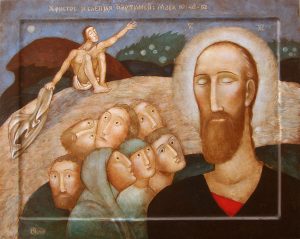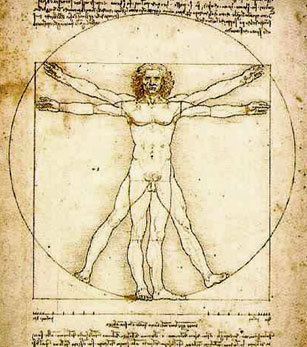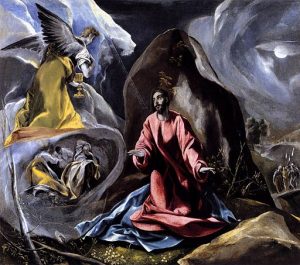====================
A homily offered by the Rev. Dr. C. Eric Funston on the Fifteenth Sunday after Pentecost, August 28, 2016, to the people of St. Paul’s Episcopal Church, Medina, Ohio, where Fr. Funston is rector.
(The lessons for the day are Proper 17C of the Revised Common Lectionary: Sirach 10:12-18; Psalm 112; Hebrews 13:1-8,15-16; and St. Luke 14:1,7-14. These lessons may be found at The Lectionary Page.)
====================
 Our first lesson today is from a book with the wholly amazing title The Book of the All-Virtuous Wisdom of Joshua ben Sira, usually (and mercifully) shortened to Sirach. It is accepted as part of the Christian biblical canon by Roman Catholics, the Eastern Orthodox, and most of the Oriental Orthodox churches. In our Anglican tradition, it is not accepted as canonical, but we do read it “for example of life and instruction of manners;” however, it cannot be used to establish any doctrine. (Article VI of the Articles of Religion, 1801) The book is in the tradition known as “wisdom literature;” basically, it is a collection of ethical teachings closely resembling the canonical Book of Proverbs, and serving the same function.
Our first lesson today is from a book with the wholly amazing title The Book of the All-Virtuous Wisdom of Joshua ben Sira, usually (and mercifully) shortened to Sirach. It is accepted as part of the Christian biblical canon by Roman Catholics, the Eastern Orthodox, and most of the Oriental Orthodox churches. In our Anglican tradition, it is not accepted as canonical, but we do read it “for example of life and instruction of manners;” however, it cannot be used to establish any doctrine. (Article VI of the Articles of Religion, 1801) The book is in the tradition known as “wisdom literature;” basically, it is a collection of ethical teachings closely resembling the canonical Book of Proverbs, and serving the same function.
This material in general does not deal with the “big questions” of life; it does not try to fathom the ultimate meaning of life or to answer the problem of evil or to explain why bad things happen to good people. Rather, the wisdom literature deals with the smaller issues of day-to-day life. “How should I handle my financial affairs? How should I relate to friends and colleagues? What about relationships to the opposite sex? What can I do to maintain a healthy marriage? How should I treat the widow, the orphan, the poor, the stranger, the aged? These are the sorts of things that [the wisdom literature] addresses.” (James Limburg, Working Preacher Commentary on Proverbs 25:6-7) They were important questions in a society where social standing was based on an unwritten but rigid system of honor and shame. They are still important questions.
Sirach, written perhaps 150 to 200 years before Jesus’ time, is somewhat more theological than Proverbs, however, and in the passage we heard this morning does address the question of why some nations fail; the author’s answer is simple, “God’s judgment.”
The Lord overthrows the thrones of rulers,
and enthrones the lowly in their place.
The Lord plucks up the roots of the nations,
and plants the humble in their place.
The Lord lays waste the lands of the nations,
and destroys them to the foundations of the earth.
What is the reason for this judgment? The pride and arrogance of their rulers and governors. To us, that may seem a bit harsh. But, as commentator Rich Procida reminds us, “These words as used in the Bible are not about feeling good about yourself and your accomplishments. They are not even about being conceited or immodest. The Book of Sirach describes arrogance as a form of hate, the devaluation of others in relation to oneself. Once devalued, evil is more easily done to others.” (Think Impunity: Understanding Arrogance and Pride in the Bible) Thus it is that Joshua ben Sira declares, “the beginning of pride is sin, and the one who clings to it pours out abominations.” Those are strong words in the honor-and-shame social milieu of the Greco-Roman world!
While the Book of Proverbs does not go as far as ben Sira does to give the credit to God, it sounds a similar note declaring, “Pride goeth before destruction, and an haughty spirit before a fall.” (Prov 16:18, KJV) Thus, in giving counsel about those day-to-day issues, about relating to friends and colleagues, Proverbs offers this piece of advice: “Do not put yourself forward in the king’s presence or stand in the place of the great; for it is better to be told, ‘Come up here,’ than to be put lower in the presence of a noble.” (Prov 25:6-7, NRS)
That should sound familiar. In today’s Gospel lesson, Luke doesn’t tell us that Jesus is quoting from Proverbs, but his “parable” – a word Luke uses that we should make special note of – about being a banquet guest is clearly derived from this bit of wisdom.
Proverbs‘ and Jesus’ advice are about much more than etiquette, more than “example of life and instruction of manners.” As I said, they deal with how one got along in and how one advanced one’s social standing in the honor-and-shame society of the Greco-Roman world of which First Century Palestine was a part. In a nutshell, it worked like this: suppose I throw a dinner party and I invite ten people to that party, all of whom come. Those ten people are now indebted to me and must reciprocate by inviting me to a similar affair in their homes. If I have been paying attention, I will have invited at least one if not two or three persons who are of higher social standing than myself. So when I am invited into their home, my social credit is advanced; I gain social standing. At least, I do if I can figure out where to position myself in the banquet hall. Hence, the advice of Proverbs: don’t “stand in the place of the great,” otherwise you will be told to go to a lower place and you will be shamed. It is better to sit in Coach and be invited into First Class, in which event you will be honored. And, believe me, there were the local, then-popular equivalents of Hedda Hopper or Matt Drudge, The National Enquirer or People Magazine to make sure that one’s honor or shame became well known in the community.
Of course, we don’t behave this way today, do we? We don’t worry about where we sit at dinner parties or banquets, right?
Wrong! Of course we do. There are “life coaches” out there making a bundle teaching entrepreneurs and business executives and even clergy how to “network,” how to jockey for position at business lunches and conferences, doing for us exactly what the writers of the wisdom literature were doing for the young courtiers of the ancient world, young men seeking a position in the courts of kings and emperors.
And if you don’t believe that there is still worry and angst about where people are seated at banquets, then you have never sat with a bride and her mother figuring out where and with whom and how far from the head table wedding reception guests should be seated. The thing about these banquets in the Greco-Roman world is that there wasn’t anyone making the seating assignments; no bride or mother of the bride filling out place cards and making the decision where you would be placed. You had to figure that out for yourself, hence the jockeying for places, and thus the advice in the Book of Proverbs.
And Jesus’ counsel sounds a lot like that advice, too, doesn’t it? The wisdom literature, especially Proverbs, was written to teach those aspiring young courtiers how to behave in order to advance. Jesus’ takes that advice, applies it to everyone, and does so as a “parable.” Remember I said we needed to take special note that Luke uses that word to describe what Jesus says to his host and the other guests. A parable. So what is a parable?
Simply put, a parable is a type of analogy; it is a short, didactic story or statement in which one thing is used to illustrate or explain some other thing. And what is always the “other thing” in Jesus’ parables? The kingdom of heaven, the eternal and abundant life to which he as God Incarnate is constantly inviting his listeners.
So what does Luke mean by calling Jesus’ counsel a “parable”? And what is Jesus saying about the reign of God with these words? Is he suggesting that life in the kingdom is like the jockeying for position that goes on at dinner parties in the honor-and-shame culture of the Greco-Roman world? Of course not! Because Jesus’ parable differs from the advice of the wisdom literature in one significant detail.
Proverbs tells the young courtier to not take the seat of the great; in other words, its advice is to be careful during that jockeying for position that goes on at state banquets. What it does not say is what Jesus says: take the lowest ranked seat available! Jesus’ parable, his counsel to his host and the other dinner guests turns the conventional wisdom literature on its head. Proverbs is saying, “Don’t be too prideful, but take the position to which you are entitled.” Jesus is saying that no one is entitled, that in the kingdom of heaven everything is given as grace, as an invitation from God to come up higher.
This is typical of Jesus’ teaching: he often takes an accepted notion and extends it to make his point. Most often he does this with notions of sin – The accepted teaching is that adultery is sinful; according to Jesus, even thinking about it is a sin! The accepted teaching is that one should not murder; according to Jesus, don’t even get angry! The accepted teaching is to not break one’s oath; according to Jesus, don’t swear at all! (See Matthew 5:21-48) So here . . . the accepted teaching of the wisdom literature is to be careful about jockeying for social position; according to Jesus, don’t jockey at all! Take the lowest place! For sure, taking the seat of the great is prideful; for Jesus, taking any seat higher than the lowest is prideful and, as Joshua ben Sira wrote, “Pride was not created for human beings.”
Jesus tells his parable and then drives home his point when he turns to the host and says, “You really shouldn’t be throwing dinner parties for those who can repay you. You shouldn’t be playing this social networking game at all! When you give a banquet, invite the poor, the crippled, the lame, and the blind. And you will be blessed, because they cannot repay you, for you will be repaid at the resurrection of the righteous.”
I love the way Dr. David Lose, the president of the Lutheran seminary in Philadelphia describes this story:
Jesus [is] telling the guy who’s invited him to his home for supper – how gauche! – and who also just happens to be a leader of the Pharisees, that his (and our) pecking orders aren’t worth squat. More than that, Jesus is inviting this guy (and us) to defy the pecking order, to actually turn it on its head. (Dear Working Preacher, More Than Good Advice)
The Australian theologian Bill Loader says that Jesus’ words were “totally absurd and . . . meant to heard that way.” (First Thoughts) “It was a crazy idea,” he says, “designed to subvert the games being played. . . . . Jesus is subverting the whole enterprise which was driving his culture and its values.” Of course, his host and his fellow guests are the ones who are invested in that culture and its values; they are the winners in the pecking order so they are going to have to put Jesus to death. If his way of looking at things catches on, they are going to be toast!
Kill him they did, and his crazy idea hasn’t caught on quite yet; brides and their mothers are still making those seating decisions for wedding receptions; entrepreneurs and executives and clergy are still jockey for position at conferences. So, as Dr. Loader says, “we (and those with whom we work) may benefit from re-examining” our own behavior; Jesus “crazy idea . . . has huge application for today.”
The Bible’s condemnation of pride, whether in the wisdom literature or the prophets or the gospels or anywhere else, is not an insistence that we abandon self interest.
People who claim to be acting . . . without any self interest are frequently in a state of denial, so much so at times that they fail to recognise [or] to control their self interest – to their own harm and that of others. The gospel is not an appeal to abandon self love, but to believe in being loved and loving and to engage in it fully in all directions, including towards ourselves. [This] invitation to love is an invitation to life, made from the premise that life’s greatest reward is to live in love and that to do so is to participate in God’s being and to best fulfil our own. (Loader)
Remember that this is more than advice from a Book of the All-Virtuous Wisdom; “this is Jesus, God’s Son, and he will come back, lifting his scarred hands in eternal blessing and benediction, inviting us [as he invited his host and the other guests] to a new vision and way of being where there is no first or last, no honor or shame, only each other, bound to one other in God’s abundant love and grace.” (Lose)
Amen.
====================
A request to my readers: I’m trying to build the readership of this blog and I’d very much appreciate your help in doing so. If you find something here that is of value, please share it with others. If you are on Facebook, “like” the posts on your page so others can see them. If you are following me on Twitter, please “retweet” the notices of these meditations. If you have a blog of your own, please include mine in your links (a favor I will gladly reciprocate). Many thanks!
====================
Father Funston is the rector of St. Paul’s Episcopal Church, Medina, Ohio.
 Two weeks ago, Mark told us the story of the rich man who came to Jesus asking “What must I do to inherit eternal life?”[1] Today, in contrast, we have the story of Blind Bartimaeus.
Two weeks ago, Mark told us the story of the rich man who came to Jesus asking “What must I do to inherit eternal life?”[1] Today, in contrast, we have the story of Blind Bartimaeus. Christology is one of those odd words of the Christian tradition that one doesn’t hear much in church but which one hears a lot in academic circles. Christology is defined as “the field of study within Christian theology which is primarily concerned with the ontology and person of Jesus as recorded in the canonical Gospels and the epistles of the New Testament.”
Christology is one of those odd words of the Christian tradition that one doesn’t hear much in church but which one hears a lot in academic circles. Christology is defined as “the field of study within Christian theology which is primarily concerned with the ontology and person of Jesus as recorded in the canonical Gospels and the epistles of the New Testament.” Our gradual this morning asks a question of God about human existence:
Our gradual this morning asks a question of God about human existence: Today we are welcoming Reed C_____ F_____ into the Household of God through the Sacrament of Holy Baptism. We are also commemorating Dame Julian of Norwich, one of the medieval saints of English Christianity. Twenty-eight years ago I was ordained a deacon on Julian’s feast day which is actually on Tuesday, May 8. So the lessons we heard this morning, and the second of the two collect I offered after the Gloria in Excelsis, were from the propers for Dame Julian’s celebration. But I would like to read you also the brief Gospel lesson appointed for the Sixth Sunday of Easter, which is also from John’s Gospel
Today we are welcoming Reed C_____ F_____ into the Household of God through the Sacrament of Holy Baptism. We are also commemorating Dame Julian of Norwich, one of the medieval saints of English Christianity. Twenty-eight years ago I was ordained a deacon on Julian’s feast day which is actually on Tuesday, May 8. So the lessons we heard this morning, and the second of the two collect I offered after the Gloria in Excelsis, were from the propers for Dame Julian’s celebration. But I would like to read you also the brief Gospel lesson appointed for the Sixth Sunday of Easter, which is also from John’s Gospel Sometimes I find myself at a loss for words. It doesn’t happen often, but once in a while I simply don’t know what to say about a person or an event or a spiritual feeling. On Good Friday, is one of the times when this happens. I don’t know what I want to say about Jesus or his crucifixion or the salvation we enjoy because of his death and resurrection.
Sometimes I find myself at a loss for words. It doesn’t happen often, but once in a while I simply don’t know what to say about a person or an event or a spiritual feeling. On Good Friday, is one of the times when this happens. I don’t know what I want to say about Jesus or his crucifixion or the salvation we enjoy because of his death and resurrection.  Across the Kidron valley from Jerusalem, at the foot of the Mount of Olives, is a small grove of olive trees. In the midst of it is a church called “The Church of All Nations” and in the center of that church, surrounded by a low wrought iron fence sculpted to resemble brambles and thorns, is a large, rough, flat rock. It is called “the stone of agony” and tradition tells us it is the place where Jesus prayed on the night before he died.
Across the Kidron valley from Jerusalem, at the foot of the Mount of Olives, is a small grove of olive trees. In the midst of it is a church called “The Church of All Nations” and in the center of that church, surrounded by a low wrought iron fence sculpted to resemble brambles and thorns, is a large, rough, flat rock. It is called “the stone of agony” and tradition tells us it is the place where Jesus prayed on the night before he died.
 A couple of months ago, I was part of a conversation among several parishioners about the set-up for our celebrations of the Nativity. We looking at our plans for Christmas services, and a member of our altar guild exclaimed, “That’s the problem! Things are always changing around here!”
A couple of months ago, I was part of a conversation among several parishioners about the set-up for our celebrations of the Nativity. We looking at our plans for Christmas services, and a member of our altar guild exclaimed, “That’s the problem! Things are always changing around here!” On Palm Sunday, I suggested that we think of Holy Week and Easter as a three-act drama beginning with an Overture on Palm Sunday. Last night, we took part in the first act. The analogy of the Three Holy Days (or “Triduum”) to a play breaks down if we think of ourselves as the “audience.” We are not the audience.
On Palm Sunday, I suggested that we think of Holy Week and Easter as a three-act drama beginning with an Overture on Palm Sunday. Last night, we took part in the first act. The analogy of the Three Holy Days (or “Triduum”) to a play breaks down if we think of ourselves as the “audience.” We are not the audience. Our first lesson today is from a book with the wholly amazing title The Book of the All-Virtuous Wisdom of Joshua ben Sira, usually (and mercifully) shortened to Sirach. It is accepted as part of the Christian biblical canon by Roman Catholics, the Eastern Orthodox, and most of the Oriental Orthodox churches. In our Anglican tradition, it is not accepted as canonical, but we do read it “for example of life and instruction of manners;” however, it cannot be used to establish any doctrine. (Article VI of the Articles of Religion, 1801) The book is in the tradition known as “wisdom literature;” basically, it is a collection of ethical teachings closely resembling the canonical Book of Proverbs, and serving the same function.
Our first lesson today is from a book with the wholly amazing title The Book of the All-Virtuous Wisdom of Joshua ben Sira, usually (and mercifully) shortened to Sirach. It is accepted as part of the Christian biblical canon by Roman Catholics, the Eastern Orthodox, and most of the Oriental Orthodox churches. In our Anglican tradition, it is not accepted as canonical, but we do read it “for example of life and instruction of manners;” however, it cannot be used to establish any doctrine. (Article VI of the Articles of Religion, 1801) The book is in the tradition known as “wisdom literature;” basically, it is a collection of ethical teachings closely resembling the canonical Book of Proverbs, and serving the same function.

